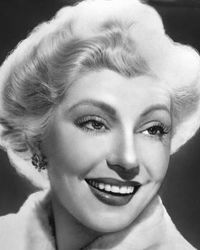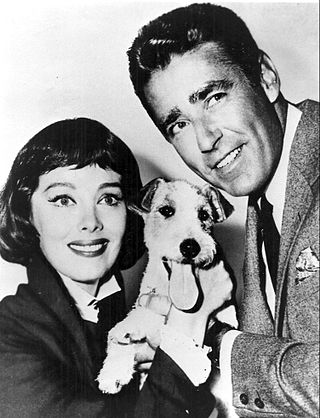Related Research Articles

Jack Benny was an American entertainer who evolved from a modest success playing the violin on the vaudeville circuit to one of the leading entertainers of the twentieth century with a highly popular comedic career in radio, television, and film. He was known for his comic timing and the ability to cause laughter with a long pause or a single expression, such as his signature exasperated summation "Well! "

Burns and Allen were an American comedy duo consisting of George Burns and his wife, Gracie Allen. They worked together as a successful comedy team that entertained vaudeville, film, radio, and television audiences for over forty years.

John Florence Sullivan, known professionally as Fred Allen, was an American comedian. His absurdist topically-pointed radio program The Fred Allen Show (1932–1949) made him one of the most popular and forward-looking humorists in the Golden Age of American radio.

Duffy's Tavern is an American radio sitcom that ran for a decade on several networks, concluding with the December 28, 1951, broadcast.

Alan Reed was an American actor, best known as the original voice of Fred Flintstone on The Flintstones and various spinoff series. He also appeared in many films, including Days of Glory, The Tarnished Angels, Breakfast at Tiffany's, Viva Zapata! and Nob Hill, as well as several television and radio series.

Mary Frances Heflin was an American actress. She is best known for her role as Mona Kane Tyler on the soap opera All My Children (1970–1994).

The Jack Benny Program, starring Jack Benny, is a radio and television comedy series. The show ran for over three decades, from 1932 to 1955 on radio, and from 1950 to 1965 on television. It won numerous awards, including the 1959 and 1961 Emmy Awards for Best Comedy Series, and is generally regarded as a high-water mark in 20th-century American comedy.

Kenneth Laurence Baker was an American singer and actor who first gained notice as the featured singer on radio's The Jack Benny Program during the 1930s.

Abe Burrows was an American humorist, author, and director for radio and the stage. He won a Tony Award and was selected for two Pulitzer Prizes, only one of which was awarded.

Portland Hoffa was an American comedian, radio host, actress, and dancer. The daughter of an itinerant optometrist, she was named after Portland, Oregon, the city in which she was born. She began her career performing as a dancer in numerous Broadway productions in the 1920s, before meeting her first husband, comedian Fred Allen. They were married in 1927, and Hoffa began performing characters with Allen in comic radio programs, often portraying a dimwitted female counterpart in fast-paced, witty skits. She gained particular notice from audiences for her distinctive, high-pitched voice.

Arlene Harris was a Canadian-born American radio, film, and television actress. She was best known for her role as "the human chatterbox" on Al Pearce's radio program.

Peter Donald was a British-born actor who worked in American radio and television. He has been called "one of radio's great dialecticians."

The Thin Man is a half-hour weekly television series based on the mystery novel The Thin Man (1933) by Dashiell Hammett. The 72 episodes were produced by MGM Television and broadcast by NBC for two seasons from 1957–1959 on Friday evening. It was the first TV series produced by MGM.

The Chase and Sanborn Hour is the umbrella title for a series of American comedy and variety radio shows sponsored by Standard Brands' Chase and Sanborn Coffee, usually airing Sundays on NBC from 8 p.m. to 9 p.m. during the years 1929 to 1948.

The NBC Comedy Hour was a comedy show that ran on NBC January 8, 1956 - June 10, 1956, as a replacement for The Colgate Comedy Hour.
Abe Burrows' Almanac is an American television series that aired on CBS from January 4, 1950, until March 29, 1950.
The Fred Allen Show was a long-running American radio comedy program starring comedian Fred Allen and his wife Portland Hoffa. Over the course of the program's 17-year run, it was sponsored by Linit Bath Soaps, Hellmann's, Ipana, Sal Hepatica, Texaco and Tenderleaf Tea. The program ended in 1949 under the sponsorship of the Ford Motor Company.

Joan Edwards was an American film actress and singer-songwriter in the old-time radio era. She was perhaps best known for her work on the radio version of Your Hit Parade. She also was a vocalist for Paul Whiteman and his Orchestra.
Phyllis Jeanne Creore was an American singer and actress in the era of old-time radio.
We Take Your Word is an American radio program that was broadcast on CBS beginning January 29, 1950. It was also adapted into a television version.
References
- 1 2 Lohman, Sidney (January 13, 1946). "One Thing and Another" . The New York Times. p. X 5. Retrieved December 11, 2024.
- 1 2 "Comedy Makes Debut Feb. 1: 'Holiday And Company; To Be Heard Over WDBJ" . The Roanoke Times. January 20, 1946. p. 14. Retrieved December 12, 2024– via Newspapers.com.
- 1 2 Aitchison, Marion (February 1, 1946). "Radio Programs" . The Miami Herald. p. 39. Retrieved December 12, 2024– via Newspapers.com.
- ↑ "Veteran Vaudeville Team Appearing Friday In New Comedy Radio Series" . Waterville Morning Sentinel. January 30, 1946. p. 5. Retrieved December 13, 2024– via Newspapers.com.
- ↑ "Fred Allen Friday Guest" . The Grand Rapids Press. February 15, 1946. p. 6. Retrieved December 12, 2024– via Newspapers.com.
- ↑ Burrows, Abe (February 1948). "My Friend Fred Allen" (PDF). Radio Mirror. pp. 29, 84. Retrieved December 14, 2024.
- ↑ Young, Kathryn (April 1946). "C. B. S. notes" (PDF). WIBW Round-up. p. 11. Retrieved December 14, 2024.